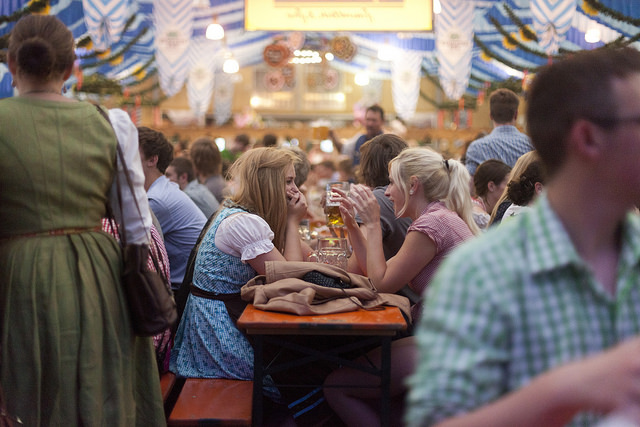Punctuality, excessive beer consumption and a lack of humour? E&M busts a few myths about Germany and its people.

As 2016 will mark the fifth anniversary of my move to Munich, I feel that I am, at last, in a good position to take stock of what I have learned here. I have seen up close and personal what makes the Germans tick. I now realise that it is useless to try to persuade one to make biscuits at any time of the year other than during the festive season and that it is impossible to find an asparagus-free menu between the months of April and June. I have come to appreciate the advantages to having a vast array of differently-sized slippers for each and every possible house guest. I’ve even all but given up apologising to people when I bump into them because I know that it will only result in bemusement and scowls.
Though much of what I have encountered was in line with my general expectations (e.g. pretzels really are a food group in their own right, Eurovision is regarded as a serious competition, which one should most definitely aim to win without irony), a few myths about the Germans do abound that are, in my opinion, in fairly dire need of debunking.
Myth #1: Germans are always on time
Firstly, and perhaps most importantly, we have the issue of punctuality. The Germans may be esteemed as the most reliable timekeepers in all of Europe, however this is, in fact, naught but a clever ruse. Over the course of my first six months in the country, I never once took a train that was on time. Berlin Brandenburg International, the fabled new airport for the the German capital, is a full decade off schedule. And at universities, they’ve even gone as far as to institutionalise lateness. Newcomers beware: if, in your timetable, you find the abbreviation c.t., which stands for the Latin phrase cum tempore, your lectures will begin precisely 15 minutes after the time stated due to what’s known as the akademische Viertelstunde (“academic quarter of an hour”). They say it’s to ensure that all involved have enough time to make their way from one room to another, but I’m not convinced. I’ve had my suspicions about the German concept of time ever since I discovered that an hour at school only lasts for 45 minutes over here.
Myth #2: Germans have no sense of humour
Secondly, the Germans are often said to be an entirely humourless people. Granted, they may laugh with inappropriate gusto at mildly amusing slapstick comedy. And yes, they are obsessed with a black and white short film called Dinner For One, which, although its original language is English and it was written by British comedian Freddie Frinton, is almost wholly unknown in the Anglophone world. But this reputation is undeserved. I kid you not: genuinely funny television programmes do exist in Germany. Personal favourites include Stasi satire Sedwitz and the bittersweet Tatortreiniger, a sitcom about a man who cleans up crime scenes for a living that never fails to surprise and delight. What’s more, it is the Germans who, with Martin Sonneborn’s Die PARTEI, managed to get the very first parody party into the European Parliament. No sense of humour indeed.

Myth #3: Germans all love beer and Lederhosen
With the possible exception of the beret-clad Frenchman, balancing a baguette and a string of onions on his bicycle, there can be few more memorable European stereotypes than the idea of the beer-swilling Bavarian, decked out in Lederhosen and a sporting a generously-proportioned curlicue moustache. Yet when one lives in a place like Munich, it soon becomes apparent that for many of the city’s sons and daughters, “traditional” events such as the Oktoberfest are, at best, a nuisance, at worst an absolute anathema and of dubious folk authenticity. Germany is not even the top beer-drinking nation in Europe (that honour goes to the Czech Republic), and, though it may be hard to believe, I’ve actually met a fair few Bundesbürger who won’t touch the stuff at all.
Myth #4: Germans are invariably cool-headed and logical
Lastly, though we might like to think of the Germans as eminently sensible and rational creatures, some of my experiences would certainly beg to differ. On many occasions now I’ve noticed a bit of a tendency towards hypochondria. Not only the elderly, but even youngsters appear have a terrible fear of draughts (remedied only by wearing scarves indoors), and just like the French with their infamous “heavy legs”, the Germans too have their own particular national ailment: Kreislaufprobleme (“circulation problems”), where symptoms can range from anything from headaches to dizziness, but which strangely seem to spare people from other countries. The most startling thing, however, that I have discovered here is the collective rocket-induced madness that grips the nation on New Year’s Eve. Germans are only allowed to let off fireworks for about an hour and a half, one night a year, you see, and they do tend to get a little carried away. The result is, quite frankly, terrifying, with explosions going off in all directions on the street. So, if you don’t mind, I’ll be spending next New Year’s Eve hiding under the kitchen table. Feel free to join me.
Teaser photo: digital cat (Flickr); Licence: CC BY 2.0








